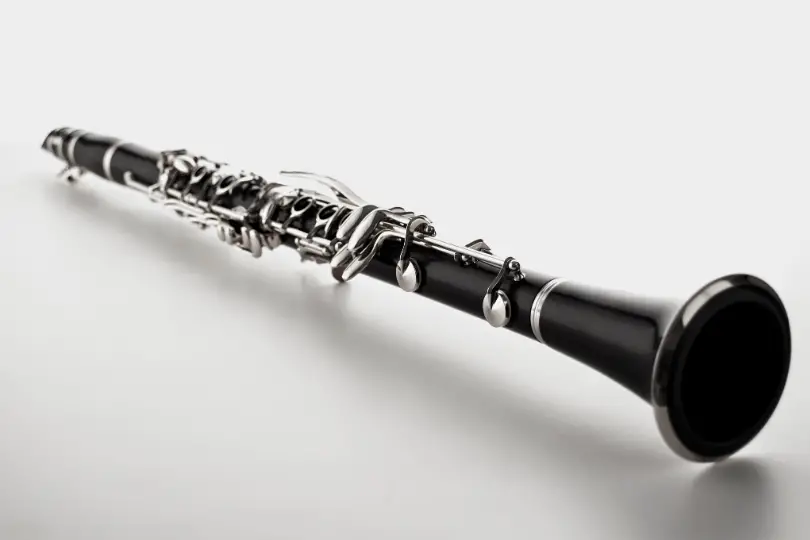When it comes time to purchase a clarinet, everyone wants to find the best instrument within their budget. So it’s important to look at how much the different clarinet models cost.
The biggest consideration in the cost of a clarinet is the instrument grade – student, intermediate, or professional. The grade is related to important aspects such as the materials used for the clarinet body, the type of key plating, and the level of handcrafting.
Depending on grade, Bb clarinets cost between around $800 and $5000, while bass clarinet prices run from $3.5K to $14K. Harmony clarinets, for their part, are sold between $2.8 and $15K.
In this post, we’ve thoroughly researched clarinet prices and we calculated average prices based on different factors including clarinet type, grade, brand, and model.
Table of Contents
Clarinet cost by type and grade
| Student | Intermediate | Professional | |
| Bb clarinets | $792 | $1,658 | $4,734 |
| Bass clarinets | $3,407 | $13,956 | |
| A clarinets | $6,331 | ||
| Harmony clarinets | $2,770 | $14,800 | |
| Eb clarinets | $5,882 |
Clarinet types
The Bb clarinet is the standard instrument that most people play. Beginning students will start out on the Bb clarinet.
The Bass clarinet is larger and plays an octave lower than the Bb clarinet. There are usually one or two bass clarinets in a school band.
The A clarinet is a more specialized instrument which is most often found in an orchestra. It is slightly larger than the Bb clarinet and plays a half step lower.
Harmony clarinets refer to instruments other than those pitched Bb and A. There is an alto, a contra alto and a contra bass clarinet. They are not used as frequently as the others.
Eb clarinet is technically a harmony clarinet, but it is used more often in band and orchestra than the others.
Clarinet grade
The difference in cost between the student, intermediate and professional grade clarinets is mainly due to the materials used and the amount of specialized work done making the instruments.
Material
Student clarinets are most frequently made of plastic, which is a good material for a beginner instrument. It’s lighter and doesn’t run the risk of cracking the way wood can.
Intermediate and professional models are most often made of grenadilla, an African hardwood which helps give the beautiful tone the instrument is known for. Of course, wood costs more than plastic.
The keys on each clarinet grade also use different material. Student and intermediate clarinets typically have nickel plated keys, while professional level clarinets sometimes come with silver plated keys.
Craftsmanship
The higher the clarinet grade, the more detailed the work of drilling and shaping the holes correctly for good response and intonation.
The keys of a professional clarinet also tend to be less noisy and tighter (less loose). More attention is given to the building of the keys and key tolerance.
Cost of professional clarinets
There are various reasons for the pricing you see for professional clarinets. The size of the instrument and the challenge of building a well-playing instrument play come into play.
The number of instruments produced can also affect the price. Far fewer Eb clarinets are made each year than the standard Bb, which tends to raise the cost.
Clarinet cost by brand
| Bb clarinets | Student/Intermediate | Professional | |
| Buffet Crampon | $1,389 | $5,254 | |
| Yamaha | $1,326 | $1,722 | |
| Backun | $1,900 | $6,045 | |
| Jupiter | $1,456 | ||
| P. Mauriat | $3,350 | ||
| Selmer | $1,653 | $6,190 | |
| Etude | $282 | ||
| Patricola | $4,014 | ||
| Giardinelli | $1,250 |
Buffet Crampon: generally regarded as the standard for clarinet, known for its consistent quality.
Yamaha: offers a wide variety of clarinets with different bore sizes and tone hole shape. Known for their great durability.
Backun: in less than 20 years, Backun is producing a wide line of instruments clarinetists love.
Jupiter: known for producing quality student and intermediate clarinets.
P. Mauriat: lesser known than the other brands. Makes affordable handcrafted clarinets.
Selmer: a highly respected brand for student and professional models.
Etude: made in China, these clarinets may not be as long-lasting as the others.
Patricola: a high-quality instrument from a relatively small Italian manufacturer.
Giardinelli: good quality clarinets at affordable prices.
Popular Bb student clarinet model prices
| Model | Price |
| Etude ECL-100 | $265 |
| Etude ECL-200 | $300 |
| Buffet Premium | $700 |
| Prelude CL711 | $600 |
Etude ECL-100 and ECL-200

These are low-cost beginner instruments. The ECL-200 features an adjustable thumb rest. Be careful with these though, as many local musical instrument repair shops won’t work on them.
Buffet Premium

This instrument serves as a good introduction to the Buffet line of clarinets. Made of plastic, it has silver plated keys, an adjustable thumb rest and comes with a backpack style case.
Prelude CL711
Made by Conn-Selmer, this beginner clarinet is made of hard rubber rather than plastic. This is said to give it a warmer toner which is closer to a wooden clarinet. It has a larger bore size, which can produce a bigger sound.
Popular Bb intermediate clarinet prices
| Model | Price |
| Yamaha YCL-450 | $1,420 |
| Selmer CL211 | $1,653 |
| Leblanc L225 Serenade | $1,590 |
| Jupiter JCL1100s | $1,400 |
| Buffet E12F | $2,079 |
Yamaha YCL-450

This clarinet has some of the qualities found in Yamaha’s professional and custom line of instruments. Made of grenadilla wood, the YCL-450 has a rich, warm sound. It comes with a quality Yamaha 4C mouthpiece.
Selmer CL211

Also made of grenadilla wood, the Selmer CL211 comes with silver plated keys and an adjustable thumb rest. It includes a Selmer USA mouthpiece and Coda Smart Music Studio software.
Leblanc L225 Serenade

Made in the US, the Leblanc L225 Serenade is a high quality intermediate clarinet. It has a beautiful tone and comes with either nickel or silver plated keys.
The grenadilla wood is unstained, giving each clarinet a distinctive look. The case comes with backpack straps and a shoulder strap.
Jupiter JCL1100s
The Jupiter JCL1100s is another good choice for an intermediate clarinetist. Made of grenadilla, it comes with silver plated keys and features ergonomic keywork which includes a C/G key riser. It also has a left hand Eb key mechanism.
Buffet E12F
This is a good instrument to choose when transitioning from a plastic to a wooden clarinet. It’s durable and the intonation is consistently good.
The grenadilla is unstained. It comes with silver plated keys. Some like the Buffet E12F as much as the R13. See our full review here.
Popular Bb professional clarinet prices
| Model | Price |
| Buffet R13 | $3,655 |
| Yamaha YCL-650 | $1,980 |
| Selmer Paris Recital | $6,059 |
| Buffet Tosca | $8,043 |
Buffet R13

The Buffet R13 has been considered the professional clarinet to have for a long time. Buffet’s history of providing quality instruments goes back a long way.
The grenadilla body has a polycylindrical bore, which produces a warm, dark sound. The standard model has nickel plated keys, but silver plated keys are an option.
Yamaha YCL-650
With an easy response, the Yamaha YCL-650 is known for its consistent intonation and beautiful sound.
Grenadilla body and silver plated keys are standard. Many feel the Yamaha YCL-650 is just as good as the Buffet R13.
Selmer Paris Recital
Featuring a darker, warmer tone, the Selmer Paris Recital is a good alternative to the Buffet and Yamaha sound. It’s made with a thicker grenadilla body to provide richness to the tone.
Key movement is light with a quick response. This clarinet has leather pads and silver plated keys.
Buffet Tosca
The development of the Tosca was a joint effort by various Buffet Crampon artists to create an unsurpassed clarinet.
With a warm sound and excellent intonation, the Buffet Tosca is handcrafted in France. It features Gore-Tex and leather pads.
Note: this instrument doesn’t come with a mouthpiece – Buffet assumes you already have a mouthpiece you prefer at this level of playing.
Tips for choosing a clarinet based on budget
If you’re looking at purchasing a clarinet, you have many brands and models to choose from. This is a good thing, but it can also make it difficult to make a decision.
Beginner clarinet
For beginners, it’s important to have an instrument which responds easily and is durable. It doesn’t need to be made of wood.
In fact, it’s probably better if it’s not because wooden clarinets are heavier and can be more difficult for young arms to hold up.
Intermediate clarinet
An intermediate clarinet needs to be a step up from the beginner instrument. You would probably want to move to a wooden clarinet at this point.
More care is given to shaping the tone holes and designing the keywork to more smoothly and comfortably. You may find that you prefer the feel of silver plated keys.
Professional clarinet
Some clarinetists who know they are serious about continuing playing skip the intermediate step and move directly to purchasing a professional model instrument.
Making that investment sooner means you don’t need to pay for an intermediate clarinet in addition to a professional instrument.
When it comes to purchasing a professional clarinet, it’s very important to try instruments out, in the same way you would test drive a car.
Each individual clarinet has its own unique characteristics, including the tone, response and intonation.
Listen online to professional clarinetists performing on the clarinets you’re interested in. That way, you’ll be able to hear what each instrument is capable of.
Enlist the help of your private clarinet teacher or band director. They can listen to you play on different instruments to compare.
How much does it cost to rent a clarinet?
The cost to rent a clarinet varies, but is typically between $20 and $50 per month. This will often include repairs if the instrument needs maintenance.
Renting a clarinet can be a good option for a student who is just beginning on the instrument – and might end up choosing a different instrument.
Frequently, a rent-to-own program is offered. With this, the rental payments go toward the purchase of the instrument.

